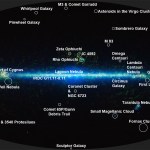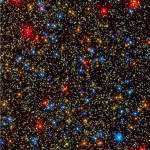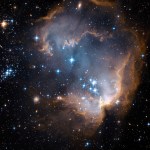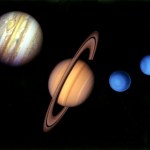gas
"Where you used to be, there is a hole in the world, which I find myself constantly walking around in the daytime, and falling in at night. I miss you like hell." -Edna St. Vincent Millay
It was just a little while ago that we were all speculating wildly -- and optimistically -- about Comet ISON, as it plunged towards the Sun from its origins in the very, very distant Solar System. As its perihelion date (the moment of closest approach to the Sun) drew near, you may have noticed something interesting about photos of the comet: it's tail appeared to get longer and longer!
Image credit &…
"One sees qualities at a distance and defects at close range." -Victor Hugo
A couple of weeks ago we took a look at the most distant galaxy (so far) in the known Universe, a galaxy so far away that it takes exclusively infrared observations from our most power space telescopes (Hubble and Spitzer) in order to detect it. What's perhaps even more remarkable is that the light we do detect from it -- the light we detected in the infrared -- was actually emitted in the Ultraviolet part of the spectrum!
Image credit: NASA, ESA, Garth Illingworth (University of California, Santa Cruz) and…
"I am undecided whether or not the Milky Way is but one of countless others all of which form an entire system. Perhaps the light from these infinitely distant galaxies is so faint that we cannot see them." -Johann Lambert
When we look out at the Universe, our view is pretty consistently dominated by the stars within our own galaxy. Although we know that many interesting things lie beyond -- globular clusters, individual galaxies, and rich clusters and superclusters of galaxies -- being in the Milky Way makes it very hard to see beyond it.
Image credit: Richard Payne, of Arizona…
"Night, when words fade and things come alive. When the destructive analysis of day is done, and all that is truly important becomes whole and sound again." -Antoine de Saint-Exupery
When you look out into the Universe, what is it that you typically think of? Do you think of reliable, fixed stars and constellations? The vast expanse of the Milky Way, with its memorable dust lanes and amorphous shapes?
Image credit: Wally Pacholka of http://www.astropics.com/.
The unchanging nature of the points of light in the sky?
Image credit: Roth Ritter (Dark Atmospheres), of the double cluster in…
"It's a brilliant surface in that sunlight." - Neil Armstrong
Indeed, all that glitters so brilliantly in the cosmos does so because of the stars that have formed throughout it.
Image credit: NASA, ESA, and the Hubble SM4 ERO Team.
Over the 14 billion-or-so years that our Universe has been around, we've formed hundreds of billions of stars in our galaxy alone.
Image credit: ESO / Serge Brunier (TWAN), Frederic Tapissier.
Given that our galaxy is just one of at least hundreds of billions in the observable Universe, the number of stars that have formed over our Universe's history is a…
"The self-same atoms which, chaotically dispersed, made the nebula, now, jammed and temporarily caught in peculiar positions, form our brains; and the 'evolution' of brains, if understood, would be simply the account of how the atoms came to be so caught and jammed." -William James
Up in the heavens, there are planets, stars, and galaxies all clearly visible in the night sky.
Image credit: Dan & Cindy Duriscoe, FDSC, Lowell Obs., USNO.
But those stars weren't always there, and they won't be there forever. The other class of object in the night sky -- the nebulae -- come in two…
Interesting picture, stolen from Early Warning.
In case it isn't obvious its the price of coal (mostly stable) and gas (much more spiky, but currently below coal) per Mbtu.
Refs
* The Future of Natural Gas - Rutt Bridges at Climate, Etc.
I'm always happy to receive questions from those of you interested enough to ask them, and every once in a while one of them feels just right to write up an article about it. Today's comes from Brad Walker, who asks about the inside of gas giants. Specifically,
The question pertains to the insides of gas giants like Jupiter... My question is, supposing Jupiter is made of Metallic Hydrogen, and it was dragged close enough to the sun that its atmosphere evaporated, what would be left? How would it go from a very strange non-terrestrial core to a rocky body like CoRoT-7b? Why wouldn't the…
Which wastes more fuel? (and thus produces more carbon dioxide). This is a difficult to question to answer for a variety of reasons. The main reason is that a speed change from 71 mph to 70 mph is different than a reduction from 56 to 55 mph.
First, let me be clear that the question of how much fuel is wasted using daytime running lights (or DRL as they are called) has already been addressed. The first source I found was howstuffworks.com
Assumptions
The daytime running lights on a car run at about 100 watts (for the pair)
The energy density of gasoline is 1.21 x 108 Joules/gallon.
A car is…
Gas prices may be trending down, but they are still quite high. How can we save gas? One of my colleagues suggested we can save gas by getting rid of all drive throughs. This means it is my job to estimate how much could be saved.
**Starting Assumptions (estimations)**
How many drive-throughs are there in the U.S.A.? When I think of drive-throughs, I think of McDonalds. [Wikipedia](http://en.wikipedia.org/wiki/Mcdonalds) says there are 31,000 restaurants world wide. I am going to say there are around 20,000 in the U.S. that have drive-throughs. So then, how many total drive-throughs?…
Alright, startswithabang-ers, Ben, my most avid commenter, saw me online while I was eating breakfast this morning, and pointed me to this new press release. Now, before you get started clicking on everything, the guy who the release is about is Brian Gaensler, who's a really nice guy, lives in Australia, whom I met at the AAS (American Astronomical Society) meeting in Austin, TX last month. Bryan's also brilliant.
Basically, what he did was he said, "well, we know what the rough density of hot gas in our galaxy is, and we can measure the timing of these pulsars to extraordinary accuracy."…







